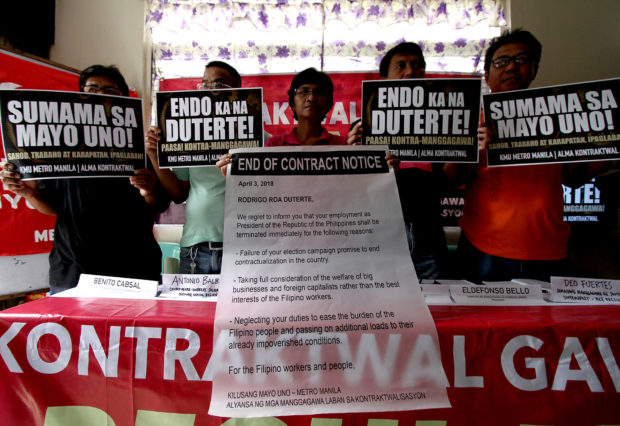Labor leaders are hopeful that President Rodrigo Duterte will sign on Monday an executive order (EO) that will regulate contractualization and make the direct hiring of employees the norm.
A day after submitting their new draft EO against contractualization to Labor Secretary Silvestre Bello III, representatives of the labor groups on Saturday urged the President to approve their recommendations, which they said would boost the protection of workers’ rights.
An official of Nagkaisa Labor Coalition (NLC) said the President received a copy of its three-page draft, the product of the coalition’s eight hours of deliberations on Friday with Bello and other labor officials.
‘Decades of injustice’
“[The draft EO] will undo decades of injustice to millions of contractualized and ‘endo’ workers enslaved in poverty by contractualization work schemes,” said Michael Mendoza, chair of NLC and national president of the Associated Labor Unions-Trade Union Congress of the Philippines (ALU-TUCP), in a statement.
Malacañang has said that totally outlawing endo, which is short for “end of contract,” is not possible at this time. But the Duterte administration is amenable to regulating contractualization, according to presidential spokesperson Harry Roque.
In separate statements, the NLC, Federation of Free Workers (FFW) and the Kilusang Mayo Uno insisted that Mr. Duterte ink an EO that would make direct hiring a government policy.
Although it prohibits contractualization, the labor groups’ draft EO will still authorize the government, workers and business groups to go through a formal tripartite process to identify what particular activities, jobs and functions will still be allowed to be contractual.
“It’s a simple enough concept: direct hiring of the employee by the principal employer, not by a third party. Certainly not by an agency, contractor or pseudo-cooperative,” Mendoza said, referring to a key provision on hiring in Section 2 of the coalition’s draft EO.
Prohibitions
“Contracting or subcontracting when undertaken to circumvent the worker’s rights to security of tenure, self-organization and collective bargaining and peaceful and concerted activities … is strictly prohibited,” he added.
Mendoza said that their proposed draft would allow the labor secretary to exempt certain jobs from the prohibition in consultation with the National Industrial Peace Council.
“The prohibition, however, is not absolute. The labor secretary … by appropriate regulations, [may] determine activities which may be contracted out,” the NLC statement said.
It is understood that Bello did not actually guarantee the draft EO’s full approval by the President.
“They presented a draft and it will be one of the drafts which we will submit to the Office of the President. The more drafts, the better for the President to have a better option,” Bello said.
‘Flesh and blood’
But Louie Corral, vice president of ALU-TUCP-Nagkaisa Coalition, expressed hopes that Mr. Duterte would accept the coalition’s recommendations.
“We therefore trust that on Monday, he will sign an executive order that will include the words ‘Consistent with the policy of this government, the direct hiring of a worker by the principal employer shall be the general norm of direct hiring,’” Corral said.
The FFW emphasized that the “direct hiring of the employee by the principal employer” should be the “general norm in employment relations.”
“To give flesh and blood to the constitutional security of tenure, the FFW is still hopeful that the President will make good his promise. We are positive that he will adopt the workers’ draft, which he requested to be drafted last May 1, 2017,” the group said.
To skip Palace meeting if . . .
Security of tenure will be strengthened “by the general norm of direct hiring,” it added.
The group also said that the new draft was “anchored on existing reality on the ground” and “better than the options suggested by [Duterte’s] ivory tower-based legal eagles.”
The coalition said they would skip the Malacañang meeting with Mr. Duterte if their draft EO would not be discussed.
“While this [draft] executive order will not amend the Labor Code, it is a clear political signal to Congress [of] what our President believes Congress must now legislate in order to comply with his promise to our workers,” the coalition said.


